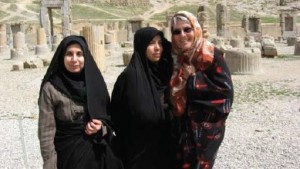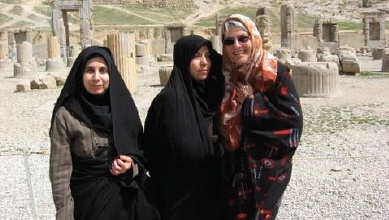
EMU’s Third Way
In the weeks after September 24, 2007, when Columbia University’s president, Lee C. Bollinger, introduced his invited guest speaker, Iranian President Mahmoud Ahmadinejad, as a “petty and cruel dictator,” the media was full of support for Bollinger’s treatment of Ahmadinejad. Many of the writers piled on more insults. One prominent blogger described the Iranian president as a “brown-skinned, terrorist-enabling, nuclearproliferating certifiable nut.”
The we-hate-Ahmadinejad writers were divided on tactics. Some believed Ahmadinejad should never have been invited. Others thought Bollinger handled it right by bringing him into the spotlight and then lashing into him.
The only rebuttal to the hate-Ahmadinejad stance came from a minority – the writers of perhaps 1 or 2 out of every 10 published letters – who held that in the interests of academic freedom Ahmadinejad should have been treated politely and allowed to speak.
At EMU, we think there is a third way that should have been taken at Columbia. It’s one that has been successfully taken with Iran by our academics, staff and students since the 1990s. It’s called active, but respectful, engagement. We hold our dissenting views. We express our views clearly. But we do so in the spirit of transforming conflict rather than pouring fuel onto it. And we do so with the knowledge and humble admission that we, too, are fallible people and that we are part of a fallible nation.
Multiple Meetings on Iran
On October 9, 2007, two weeks after Ahmadinejad was insulted at Columbia, EMU president Loren Swartzendruber sat near me at a lunch round-table with one of Ahmadinejad’s advisers, Ali Akbar Rezaei, a senior member of Iran’s Foreign Ministry.
Swartzendruber, who holds a doctorate in ministry, opened the lunch with a prayer in which he asked for God’s blessing on the food we were about to eat and on the dialogue we were about to have. Swartzendruber then excused himself from the lunch with Rezaei with the explanation that he was heading to a lunch presentation on building peace through interfaith dialogue, study, and exchange, given by Roy Hange, a pastor-scholar who had spent 1997-99 in Qom, Iran, studying Islam as well as Persian language and literature.
For Rezaei – who had been responsible for setting up meetings for Ahmadinejad in New York in September – this was the beginning of 24 hours of contact with CJP faculty, staff, and students, including nine from the Middle East, mostly Fulbright students. Some of these students, joined by six Muslim students from other countries, had a meeting with Rezaei in which they respectfully, but frankly, disagreed with most of Rezaei’s characterizations of Iran’s policies, particularly with his description of Iran as a “status quo” state. Rezaei counter-challenged them to not take Fox News about Iran at face value. He encouraged people to come to Iran and see for themselves.
I had met and been impressed by Rezaei seven years ago when he came to EMU’s annual Summer Peacebuilding Institute. At the time, he was a young scholar in Iran’s Institute for Political and International Studies. Rezaei took five successive classes, including one on strategic nonviolence and one on inter-religious peacebuilding taught by Marc Gopin, an orthodox Jewish rabbi who is now director of the Center on Religion, Diplomacy and Conflict Resolution at George Mason University.
After Rezaei studied at EMU, he spent four years in London, working in the Iranian embassy there. He next worked in the Foreign Ministry in Tehran as director of the North and Central America Department.
Open-Hearted Visitor
It was a pleasure to see Rezaei again and note that his intelligence, open-heartedness and curiosity were undiminished. Over lunch – attended by more than a dozen faculty and staff members – Rezaei expressed concern that both the United States and the Islamic world contain an influential minority of people who “think they are 100 percent right, that God is with them, that everyone else is wrong, and that they are the only good guys in the world, so they should impose their views on everyone else.” He noted that those who planned the invasion of Iraq and the men who organized and executed the 9/11 terrorist attacks on the United States demonstrated similar biases in their thought patterns.
Rezaei lamented mutual ignorance about each other’s countries. He said many Iranians view Americans as being uncivilized people who don’t believe in God, who like killing people and who want to eradicate Muslims. He said, “We desperately need ways to overcome this ignorance.”
He didn’t have to articulate how most Americans view Iranians. All of us sitting at that lunch table were painfully aware of the ignorance about Iran in our own society. I had experienced this myself when I visited Iran as part of a Fellowship of Reconciliation delegation of “civilian diplomats” in March 2007. We thought we would be viewed as the “enemy” in Iran. Instead our group of Americans, seeking to exchange ideas with a broad range of Iranians, was extended warm hospitality wherever we went.
In the last 18 months, faculty and students from various departments of Eastern Mennonite have taken trips to Iran. Two recent graduates attended a human rights conference in Qom in May 2007, giving presentations on human rights from a Christian perspective. One of our seminary professors gave a theological paper at a conference in Iran on messianism. EMU has also hosted a number of Iranian visitors, including several university professors and an Iranian researcher from the University of Tehran, who attended two sessions of the 2007 Summer Peacebuilding Institute.
Not to Minimize Our Differences
To be sure, there are numerous issues between Iran and the United States that deserve very serious scrutiny. No one is served by naiveté or ignoring those concerns. One of our Indonesian Muslim students raised concerns about Mennonites interacting with Iranian officials in this e-mail message to me:
“I’m writing this e-mail just to ‘remind’ the Mennonites to be careful in building networks and relationships with the Iranian government. Who takes benefit from this ‘peacebuilding project’: Iranians, Mennonites, Muslims, the United States? I am afraid there is a ‘hidden agenda’ behind the meeting.
“They just use the Mennonites to send their ‘peaceful message’ to the American public, while at the same time they produce uranium, discriminate against non-Shi’ite communities and non-Muslims, massacre members of the Baha’i faith, and so on and so forth.
“Last, but not least, hopefully what I was thinking does not happen. Hopefully, by the Mennonites’ intervention, justice and peace will greet Iran, like in the Harrison Ford movie ‘Witness.’”
We in the peacebuilding field cannot know whether eventually “justice and peace will greet Iran,” just as we cannot know whether eventually the United States will choose the path of equitable peace in the world instead of military and economic dominance. But we are certain that to transform conflict and lay the groundwork for a better future, one must treat others the way one would want to be treated. The more effort we make to peer through the lens of the “other,” the less likely we will end up in violent conflict.
Seeking to “practice what I preach,” I was one of about 120 people from a dozen religious groups and institutions who met with Ahmadinejad two days after his speech at Columbia University. Requested by Iranian officials, the meeting was organized by the relief and service agencies of the Mennonites and Quakers, but included Catholics, Episcopalians, Methodists, Christian university leaders, and many others.
Civil Dialogue Always Better
During the two-hour session, Ahmadinejad addressed the audience for 20 minutes. Five panel members, selected for their range of perspectives, responded to his speech and asked their own questions. The dialogue covered the differences many of us have with Ahmadinejad, but it was conducted with respect and civility on all sides.
I believe this model is a better one for encouraging positive change – on both sides – than verbal attacks. I agree with the petition circulated by Columbia students, which was signed by 660 people online in the weeks after the Columbia University incident, in which the petitioners expressed distress that “inflammatory words were delivered at a time when dialogue with Iran is of the utmost importance in an effort to forestall war.”
We in the academic world must always be open to dialogue, which means respectfully listening as well as frankly speaking in a civil manner. I often disagree with positions that President Bush takes, but I would never presume to change his views and behavior through refusing to speak to him or insulting him.
Instead of limiting our choices to, on one hand, treating Ahmadinejad hatefully or, on the other hand, inviting him to speak without rebuttal in the interests of academic freedom, we advocate a third way: respectful, but active, engagement with those with whom one disagrees. This is what Martin Luther King did and wrote about in his “Letter from a Birmingham Jail.” It’s what Gandhi did in India with the British. And it is what Nelson Mandela did with the leaders of the South African regime that jailed him for 27 years.
We advocate this third way both for intellectual and spiritual growth, as well as for combating injustice and achieving peace. Nothing is ever gained by pouring fuel onto a simmering fire.
[The online journal Inside Higher Ed posted a slightly longer version of this article on November 9, 2007. The author, Pat Hostetter Martin, MA ’98, is the director of the Summer Peacebuilding Institute. She plans to retire in the summer of 2008, after overseeing the 13th session of the summer institute. In her young adult life, Pat and her husband Earl were Mennonite Central Committee representatives in a Vietnamese village in the 1970s, working for peace amidst the violence of war.]
